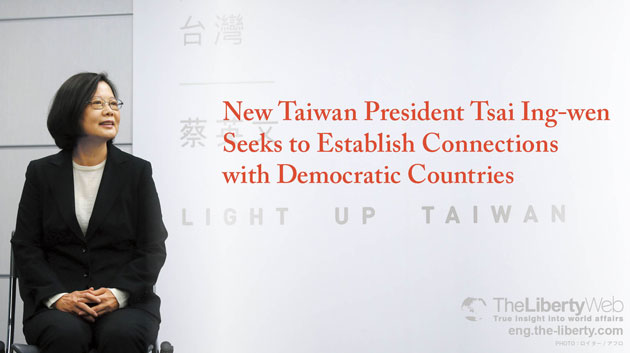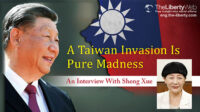Tsai Ing-wen Becomes President of Taiwan
Establishing Connections with Democratic Countries like the U.S.
A new administration has been established in Taiwan, and it is highly cautious of China. On the 20th of May, chairwoman Tsai Ing-wen of the Democratic Progressive Party, having won the Presidential elections in January, was inaugurated as fourteenth President of Taiwan, after taking the oath of office in the Presidential Suite in Taipei.
While advocating stabilization in their relations with China in her inauguration address, Tsai mentioned her intentions of advancing connections with democratic countries, such as the U.S. and Japan, who uphold the same values she espouses.
Makes no direct reference to China’s “One China” ideology
The public and media were eager to know what Tsai would say about China’s “One China” ideology, which states that Taiwan is part of China. China, whose intention it is to eventually annex Taiwan, has been pressing Tsai to accept the “One China’ ideology and the 1992 Consensus, which was the alleged occasion at which the ideology was verified.
Tsai, however, did not mention the Consensus. She only said that she acknowledges the fact that contact agencies of China and Taiwan had talks in 1992. She showed her considerations for China, however, as she mentioned her intention of rectifying relations with China.
Taiwan’s Important Role in Maintaining Peace in Asia
Even after becoming the leader of Taiwan, Tsai is unable to proclaim her true thoughts due to pressures from China.
Master Ryuho Okawa, founder of Happy Science, recorded Tsai’s true thoughts in a spiritual message by her guardian spirit on February 7th, soon after the elections. Tsai’s guardian spirit spoke of how Taiwan could overcome the problems it is currently facing.
She said the following regarding Taiwan’s financial problem, which was triggered by Kuomintang under the Ma Ying-jeou Administration and its excessive reliance on China’s economy:
“Taiwan can survive without dealings with China, as long as we are connected with Japan . . . the origin of Taiwan’s prosperity lies in the fact that Taiwan was connected to Japan, In other words, being pro-Japan was what allowed us to prosper. This is why I think being pro-Japan will allow us to maintain connections with Europe and the U.S. The question is which culture to merge with.”
With regards to China’s increasing hegemony, she explained the need to spread liberalist views and the formation of a New Greater East Asia Co-Prosperity Sphere. She said:
“In order to overcome China’s ‘One Belt, One Road’ ideology places such as Taiwan, Sri Lanka and India must hold firm, and support the Philippines with our national policies. This will sandwich China.”
If China swallows Taiwan the latter will become China’s military base, and the Okinawa region will become ever more volatile. Taiwan’s independence issue is not unrelated to Japan.
In her inauguration address, Japan was at the top of Tsai’s list of potential partner countries. Official diplomatic relations and military partnerships will lead to enhancing Japan’s national interests, and will consequently lead to protecting peace in Asia. Through public exchanges of culture and finance, we can help acknowledge Taiwan acknowledged as a country by the international community.


![The Laws of Justice:How We Can Solve World Conflicts and Bring Peace [Kindle ebook] by Ryuho Okawa/Buy from amazon.com](/files/2016/04/160426_kindle-amazon.jpg)

















